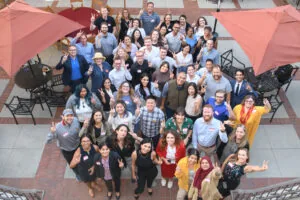Description
With the global balance of power in flux, to what degree should the United States try to maintain the post-World War II order? Should we try to remain the world’s dominant power and defender of democracy and free markets? Or is there another path forward, something in-between the America-first policy and the global superpower of the past?
A panel of scholars from the School of International Relations (SIR) at the USC Dornsife College of Letters, Arts and Sciences explores the role of the U.S. in the global economy and international politics. Featuring Carol Wise, professor of political science and international relations; Brian Rathbun, professor of international relations; and Saori Katada, professor of international relations. Moderated by David Kang, Maria Crutcher Professor in International Relations, Business and East Asian Languages and Cultures.
Who Will Benefit
– Those looking for predictions on the Biden administration’s foreign policy plans
– Policy experts who want a worldwide view on the next steps for U.S.-global relations
– Those seeking a better understanding of the U.S.’s current role in international economics and worldwide politics
About Our Featured Faculty
Saori Katada is a professor at the School of International Relations at USC Dornsife College of Letters, Arts, and Sciences. She is the author of a book Banking on Stability: Japan and the Cross-Pacific Dynamics of International Financial Crisis Management (University of Michigan Press, 2001), which was awarded Masayoshi Ohira Memorial Book Award in 2002. She also has three co-edited books: Global Governance: Germany and Japan in International System (Ashgate, 2004), Cross Regional Trade Agreements: Understanding Permeated Regionalism in East Asia (Springer, 2008) and Competitive Regionalism: FTA Diffusion in the Pacific Rim (Palgrave Macmillan 2009). She has written numerous articles on international political economy including topics such as regional integration, foreign aid policy, financial politics and free trade agreements. Her current research focuses on the trade, financial and monetary cooperation in East Asia, and the impact of the global financial crisis on Japanese financial politics and regional integration efforts. For her research on regionalism, she was recently awarded the Japan Foundation Research grant, and National Endowment for the Humanities Fellowship. She has her PhD from University of North Carolina at Chapel Hill (Political Science) in 1994, and BA from Hitotsubashi University (Tokyo). Before joining USC, she served as a researcher at the World Bank in Washington DC, and as international program officer at the UNDP in Mexico City.
Brian Rathbun is a professor of international relations at the School of International Relations at USC Dornsife College of Letters, Arts, and Sciences. He received his PhD in Political Science from the University of California, Berkeley in 2002 and has taught at USC since 2008. He has written four solo-authored books, on humanitarian intervention, multilateral institution building, diplomacy and rationality. His articles have appeared or are forthcoming in International Organization, International Security, World Politics, International Studies Quartlery, the Journal of Politics, Security Studies, the European Journal of International Relations, International Theory and the Journal of Conflict Resolution among others. He is the recipient of the 2009 USC Parents Association Teaching and Mentoring Award.
Carol Wise joined the School of International Relations at USC Dornsife College of Letters, Arts, and Sciences in 2002 after spending eight years on the faculty at Johns Hopkins University’s School of Advanced International Studies in Washington, DC. She specializes in international political economy and development, with an emphasis on Latin America and Pacific Asia. She has written widely on trade integration, exchange rate crises, institutional reform and the political economy of market restructuring in the region. Wise just completed a book-length project — Dragonomics: How Latin America is Maximizing (or Missing Out) on China’s International Development Strategy (Yale University Press, 2020) — which analyzes the rapid and remarkable ties that have developed between China and Latin America since the 1990s. Wise’s most recent publications include The Political Economy of China-Latin America Relations in the New Millennium (co-edited with Margaret Myers, Routledge, 2016); “Playing both Side of the Pacific: Latin America’s Free Trade Agreements with China,” Pacific Affairs (2016); and “Conceptualizing China-Latin America Relations in the 21st Century,” The Pacific Review (2018). Wise held the Fulbright-Masaryk University Distinguished Chair, Czech Republic, in 2019.
David C. Kang is Maria Crutcher Professor in International Relations, Business and East Asian Languages and Cultures at USC, with appointments in both the School of International Relations and the USC Marshall School of Business. At USC, he is also director of the Korean Studies Institute and vice-chairman of SIR. Kang’s latest book is American Grand Strategy and East Asian Security in the 21st Century (Cambridge University Press, 2017). He is also author of East Asia Before the West: Five Centuries of Trade and Tribute (Columbia University Press, 2010); China Rising: Peace, Power, and Order in East Asia (Columbia University Press, 2007); Crony Capitalism: Corruption and Development in South Korea and the Philippines (Cambridge University Press, 2002); and Nuclear North Korea: A Debate on Engagement Strategies, co-authored with Victor Cha (Columbia University Press, 2003). Kang has published numerous scholarly articles in journals such as International Organization and International Security, and his co-authored article “Testing Balance of Power Theory in World History” was awarded “Best article, 2007-2009,” by the European Journal of International Relations. Kang has also written opinion pieces in the New York Times, the Financial Times, the Washington Post and the Los Angeles Times, as well as writing a monthly column for the Joongang Ilbo in Korean. He received an AB with honors from Stanford University and his PhD from Berkeley.



